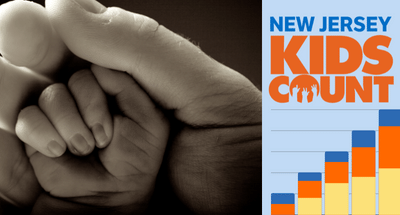Posted on September 20, 2021
 By Mary Coogan, Vice President, ACNJ
By Mary Coogan, Vice President, ACNJ
Effective policymaking requires accurate and current data. Data can show patterns or trends, both positive and negative. It allows government officials, funders and advocates working with children and families to determine whether programs are effective, in need of modification or additional funding, and where new programming is needed.
For more than 30 years, ACNJ has produced New Jersey Kids Count data reports in order to document key measures of child well-being to help guide conversations about policy and programs. We continue to add more data to our Kids Count data dashboard, which we hope you find helpful. One area in which data is being used to drive change, particularly with regards to racial disparities, is New Jersey’s child welfare system.
Data show that 73,726 children were reported as possibly being abused and/or neglected in 2020, down from 88,969 children in 2016. There has been a steady decline, by more than 60 percent, since 2016 in the number of cases in which an allegation of abuse and/or neglect was substantiated or established, i.e. determined to have occurred as defined by statute (8,256, or 9.3 percent, in 2016 to 3,134, or 4.3 percent, in 2020). There are also significantly fewer children living in foster care (6,663 in 2016 to 3,717 in 2020).
But the data also show that Black and African American children are overrepresented in New Jersey’s child protective services system. Black and African American children are disproportionately reported for cases of abuse or neglect in comparison to other demographic groups, yet are not overrepresented in the rate of substantiated or established findings. Consistently over the years, 40 percent of children living in foster care are Black or African American, although fewer than 15 percent of children under age 18 in New Jersey are Black.
The data do not tell us why this is happening. That is up to those working within the child welfare system to figure out, and steps are being taken to address racial disparities in particular. In order to create a more equitable system, the Commissioner of the New Jersey Department of Children and Families (DCF), Christine Norbut Beyer, has publicly committed to a self-examination of how the work of DCF - consciously or not - may contribute to racial disparities in New Jersey. DCF engaged national experts and trainers, including Dr. Jessica Price and Carol Wilson Spigner, MSW, DSW, to train and work with staff to develop and implement a race equity strategy.
Other significant efforts to address the systemic and implicit bias that leads to more children of color being placed into foster care are being coordinated by the NJ Children in Court Improvement Committee (CICIC). The membership of the CICIC includes DCF staff, judges and court staff, attorneys, court volunteers and service providers (including ACNJ). Under the leadership of the Honorable Glenn A. Grant, J.A.D., Acting Administrative Director of the New Jersey Courts and his staff, the CICIC held several race equity summits, bringing in national experts to talk about systemic racism and the impact of implicit bias. Court staff are using data such as types of placements and length of time children remain in care by race and ethnicity to set goals and implement strategies for change. Regional teams have been created and trained to work more closely with their respective counties, helping local stakeholders engage in conversations about racial equity and implicit bias in relevant laws, policies and practices that may be adversely impacting children and families of color, all backed by numbers.
The momentum is building for real change towards achieving racial equity within our child welfare system, and stakeholders are using data to drive that change. We all have a role in this process and need to work together. Our children deserve nothing less.
Check out the new data on ACNJ's Kids Count data dashboard! Featuring up-to-date information on the state of children in the Garden State.
KIDS COUNT is a project of the Annie E. Casey Foundation to track the well-being of children in the United States. By providing high-quality data and trend analysis through its KIDS COUNT Data Center, the Foundation seeks to enrich local, state and national discussions concerning ways to secure better futures for all children — and to raise the visibility of children's issues through a nonpartisan, evidence-based lens. Other data is available at Annie E Casey Foundation data centers at https://www.aecf.org/work/kids-count/kids-count-data-center.

